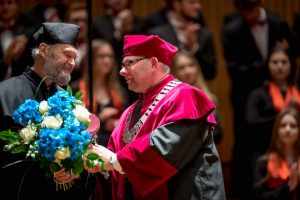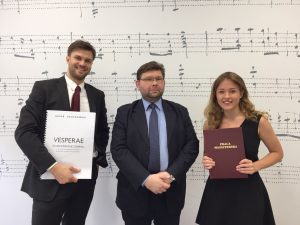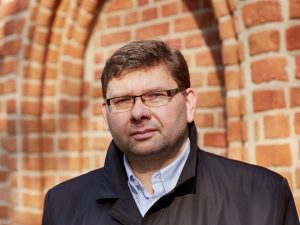Interview with Paweł Łukaszewski
By Karolina Silkina, choral conductor and journalist
Karolina Silkina: How did your music adventure begin? When did you realize that music was your vocation?
Paweł Łukaszewski: My family has deep musical traditions. My father was a composer and my mother was the director of the Music Schools Complex in Czestochowa. It became obvious when I started studying at a music school and finished all levels of music education. I decided that I would continue my studies at the Music Academy in Warsaw and from that moment, I have felt that music became my vocation, composition especially. I have started a gradual transition into music by playing the cello in the chamber ensembles, orchestras, singing in choirs, composing, participating in competitions and music courses. Music has become my way of life.
KS: A great amount of your music is sacred compositions. Tell me, what was your inspiration to begin to work in this field?
PŁ: My childhood experiences are my inspiration. This was a period of martial law and “Solidarity” (Polish trade union) – the greatest patriotic movement. In addition, Częstochowa, my hometown, and the Jasna Góra monastery also are my inspirations.I was at numerous performances of Penderecki, Górecki and Kilar’s wonderful compositions. I also attended the pilgrimage of Pope John Paul II to Poland.I was a singer in the Academy of Catholic Theology Choir, where we recorded numerous compositions and premieres of sacred words. Thanks to this and on the request of the conductor and choral singers, my first compositions appeared.
KS: Which musicians/composers inspire you and why?
PŁ: Brahms, Mendelssohn, Faure, Rachmaninoff, Arvo Pärt, John Tavener, Henryk Mikołaj Górecki and many others. I value them all for their musicality, for the beauty and perfection of the works, for the sincerity of the composer’s expression.

KS: Do you have a favorite composition of yours, the composition you are most proud of?
PŁ: There are several compositions which I like. I think that Via crucis is one of them but I also adore Symphony No. 3 – Symphony of Angels. I have been always inspired by the world of angels. I have read many texts, including Pseudo-Dionysius Areopagites and apocryphal writings, including the Book of Enoch and the Catechism of the Catholic Church. I have written my symphony to these texts, using special instruments such as Chinese balls and Tibetan bowls. Every man has his Guardian Angel and I have dedicated my composition to my angel.
KS: Let’s speak about your special composition techniques which describes your own style
PŁ: I do not use special compositional techniques. I base my experience on traditions because I think that much can be achieved, when the music language is understandable for everybody.
I can mention reductionism, which is the principle of limiting both the sound and rhythmic material and striving for the perfect combination of text and music. We must remember that each composer is different. I personally believe, that in the tonal system, you can still do a lot. That is why I have called this technique a renewed tonality.
KS: How would you describe your general process for creating a new score?
PŁ: I get up very early and can compose in every situation.First of all I am looking for the right form of the composition like its construction and then the right sounds, chords, harmony. It takes a lot of time for me to choose the right texts and its searching sometimes lasts several months.
KS: How does the text connect with melody and harmony in your music, and how important is text for you in the process of composition?
PŁ: Each word should be illustrated and described by using of the correct sound. I am looking for this sound, consonance or interval. I treat the text with respect. I am still looking for it…
KS: How do you think music should be accessible on the first hearing?
PŁ: It depends. On the one hand, you have to listen to the composition several times to understand it, to understand the meaning and the message of the music. On the other hand, music can impress us from the first sounds. It is very important that the music should touch the listener.
KS: In your opinion, how does the composer communicate with the audience in his works?
PŁ: Music is a language and the composer communicates with the audience and listeners by sounds. Communication takes place at various levels of penetration into a musical work: sometimes superficially, and sometimes very deeply, through simple means or in a very veiled, hidden way.
KS: For whom do you write your compositions?
PŁ: I compose for myself, for friends, acquaintances, family, but many of all my compositions are my way of contact with God. For many years I have been composing for various institutions and ensembles from Poland and abroad.
KS: You are the composer but also a conductor. How does conducting influence your style?
PŁ: This is a very important experience. I am a choir conductor and I have my own choir in the cathedral of Saint Florian. This experience does not affect the style of composing, but it is connected a lot with a technical sphere: the metric and tempo, the flow of the time and its understanding in other words.

KS: What does it feel like conducting your own piece?
PŁ: I conduct my own compositions sometimes, but it is not my favorite activity. I prefer to conduct the works of other composers. I know my own works very well and I have no patience with the performers.
KS: How would you describe the relationship between the composer and the conductor during preparing the composition for the concert?
PŁ: Both roles are very important, they complement each other. A good conductor and a good ensemble is a guarantee of the composer’s success. I always take part in the rehearsals for the premieres of new works and I am open to the conductor’s suggestions. I also hope that the conductor will understand my intentions.
KS: You are also a teacher. What is your advice to young composers?
PŁ: First of all, I encourage them to be perseverant on their way to their goals. I suggest that they should not give up in their own creative intentions and look for music in themselves mainly.
KS: Do you feel responsibility for the choir music when you compose your compositions?
PŁ: After many successes that my music has achieved, I think, I can state that I understand the choral music and my own place in it. I believe that in the future my choral works will be performed and recorded as regularly as nowadays. I do not strive for the performances but they constantly appear in different parts of the world.
KS: Do you have a life motto?
PŁ: I wish my music would encourage reflection and, by slowing the pace of life, help people to concentrate and contemplate. My compositions are the reflection of my personality and formation, which I have gone through. As Boethius said: Musica humana, not Musica vulgaris. Perhaps, by creating such music, I will become an intermediary in transferring the Truth.
KS: Where do you see yourself in 10 years?
PŁ: I hope that I will have a chance to compose many new compositions, maybe I will write operas. I hope that I will have more time than now. I do not want to give up my activity, which is also connected with work as a pedagogue at the University and conducting the choir. I want to continue doing it!
Paweł Łukaszewski Biography

Paweł Łukaszewski was born in 1968 in Częstochowa, Poland. A professor, he is one of the younger generation of Polish composers specializing in sacred and choral music. He studied composition with Professor Marian Borkowski at the Fryderyk Chopin Academy of Music in Warsaw. He received a Ph.D (2000) and a Ph.D Hab. (2007) in composition. His works have been performed throughout Europe including Great Britain, Belarus, Belgium, the Czech Republic, Denmark, France, Germany, Iceland, Italy, Lithuania, Luxemburg, Malta, Moldova, Monaco, Poland, Romania, Switzerland, Ukraine and at the Vatican as well as in Argentine, Chile, China, Israel, Cuba, Canada, South Korea, Peru, Uruguay and in the United States. Paweł Łukaszewski was highly awarded for his fascinated and very valuable work:
- First Prize at the Frédéric Chopin Academy of Music Competition for Arrampicata
- Second Prize at the Young Composers Forum in Kraków for Winterreise
- An award from the President of Częstochowa for his entire musical output
- Second Prize in the Adam Didur competition in Sanok for Recordationes de Christo moriendo
- Second Prize in the Florilege Vocal de Tours Competition in France for Two Lent Motets
- Two Third Prizes in the Pro Arte competition in Wrocław for Church Songs.
Moreover, Professor has received the Knight’s Cavalry Order of the Rebirth of Poland, Saint Albert Award, Bronze Medal “Gloria Artis”, the Primate Prize of Poland, The Golden Orphee Award and Fryderyk 2007, 2012, 2013, 2015, 2016, 2017 Award. Łukaszewski has taught composition at various institutions including the Fryderyk Chopin University of Music in Warsaw and in Chile as visiting professor at the Pontificia Universidad Católica de Chile in Santiago, the Pontificia Universidad Católica de Valparaíso, the Universidad de Chile in Santiago and the Universidad de Playa Ancha in Valparaíso. Also an active conductor, Paweł Łukaszewski is Artistic Director and Conductor of Musica Sacra Cathedral Choir in Warsaw. His works have been recorded on more than 150 CD albums. Email: lukaszewski@chopin.edu.pl

Karolina Silkina was born in Grodno, Belarus. There she started her fascinating musical adventure playing the piano, singing in the choir, taking part in numerous concerts and winning competitions. Karolina completed her bachelor’s degree in Public Relations and Media Marketing (Journalism Department) at the University of Warsaw. She currently is continuing her master’s studies at Alma Mater (University of Warsaw). She is interested in PR, visual marketing, communication and event marketing. In addition, Karolina is a third-year student of Choral and Music Ensembles Conducting at the F. Chopin University of Music. Karolina is the founder and conductor of the Journalism Department choir at the University of Warsaw. Also she is a choral singer (soprano) at the F. Chopin Chamber Choir and University of Warsaw Choir. Email: caroline.silkina@gmail.com
Edited by Louise Wiseman, UK

